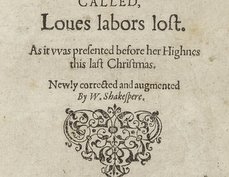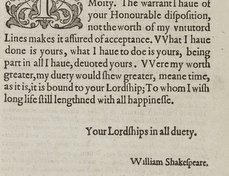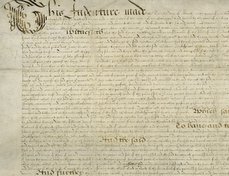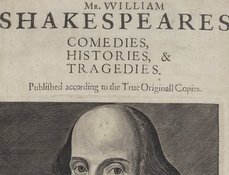Terms of Use
Images that are under Folger copyright are licensed under a Creative Commons Attribution-ShareAlike 4.0 International License. This allows you to use our images without additional permission provided that you cite the Folger Shakespeare Library as the source and you license anything you create using the images under the same or equivalent license. For more information, including permissions beyond the scope of this license, see Permissions. The Folger waives permission fees for non-commercial publication by registered non-profits, including university presses, regardless of the license they use. For images copyrighted by an entity other than the Folger, please contact the copyright holder for permission information.
Copy-specific information
Creator: William Hervey
Title: Epicedium, a funerall song, vpon the vertuous life, and godly death, of the right vvorshipfull the Lady Helen Branch.
Date: London: Printed by Thomas Creede, 1594
Repository: Folger Shakespeare Library, Washington, DC, USA
Call number and opening: STC 12751, title page & sig. A1v-A2r
View online bibliographic record
Erin A. McCarthy, "Epicedium, a funerall song: first printed allusion to Shakespeare's Lucrece," Shakespeare Documented, https://doi.org/10.37078/193.
Folger Shakespeare Library, STC 12751. See Shakespeare Documented, https://doi.org/10.37078/193.
Epicedium, a brief quarto pamphlet made up of only a single poem in memory of Lady Helen Branch, contains one of the earliest allusions to Shakespeare’s Lucrece by name. Lady Branch, the widow of Sir John Branch, who had served as Lord Mayor of London in 1580, died on April 10, 1594. This is one of four poetic tributes to her published shortly after her death.
The opening stanza of Epicedium departs slightly from the traditional form of the funeral poem. Rather than invoking the muse, the poem’s speaker lists several poets who would be better equipped to praise the late Lady Branch:
You that haue writ of chaste Lucretia,
Whose death was witnesse of her spotlesse life:
Or pend the praise of sad Cornelia,
Whose blamelesse name hath made her fame so rise:
As noble Pompeys most renoumed wife.
Hither vnto your home direct your eies:
Whereas vnthought on, much more matter lies. (A2r)
The first poet, of course, is likely Shakespeare, whose popular Lucrece was first published in 1594. The speaker suggests that the real women of England, like Lady Branch, would be richer subjects for poetry and are unfairly neglected by poets who write about classical figures. The second poet is probably Robert Garnier, whose tragedy Cornelia had been published in two separate issues in 1594.
Epicedium includes an attribution to “W. Har” on its last page, but the poem is generally attributed to the naval officer William Hervey, Baron of Kidbrooke and later Ross (sometimes proposed as a candidate for the “Mr. W.H.” of Shakespeare’s sonnets).
Two copies are known to survive: one at the British Library and one at the Folger Shakespeare Library. Mr. Folger purchased this volume in March 1927.
Written by Erin A. McCarthy
Sources
John C. Appleby, “Hervey, William, Baron Hervey of Kidbrooke and Baron Hervey of Ross (d. 1642).” In Oxford Dictionary of National Biography, edited by H. C. G. Matthew and Brian Harrison. Oxford: OUP, 2004. Online ed., edited by Lawrence Goldman, January 2008. <http://www.oxforddnb.com/view/article/13121>
S. P., An Epitaph of the Vertuous Life and Death of the Right Worshipfull Ladie, Dame Helen Branch of London (London: T. Creede, 1594): STC 19078.4.
John Philips, A Commemoration of the Life and Death of the Right Worshipfull and Vertuous Ladie; Dame Helen Branch (London: J. Danter, 1594): STC 19863.7.
Joshua Sylvester, Monodia (London: P. Short, [1594]): STC 23579.
F.J. Furnivall, C.M. Ingleby, and L. Toulmin Smith, comps, The Shakspere Allusion-Book: A Collection of Allusions to Shakspere from 1591 to 1700, ed. John Munro (London: Oxford University Press, 1932): 1:14.
Last updated January 25, 2020











